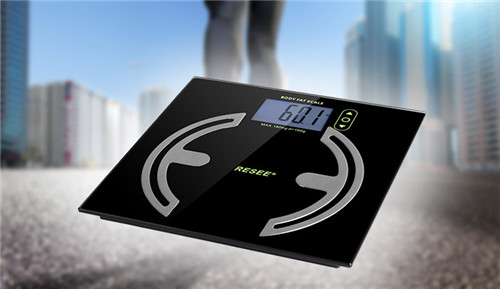How accurate is the measurement of body fat scale? Simple answers are simply inaccurate.
In fact, you can't rely on any body fat test to track fat loss and muscle growth. Using the results to guide your training and dietary decisions may lead you completely in the wrong direction. I'll explain why.
First of all, I want to step back and explain why I don't believe any intelligent body fat scale tests body fat.
What intelligent body fat scale is tested accurately?
Without a body fat test, you can measure your fat content with either an intelligent fat scale or a skin fold caliper. The only way to measure body fat is to peel it off, stand on an intelligent body fat scale, and then weigh it. Although this method is very accurate, in order to achieve it, you must be dead set. To explain James Kriging, a founder of gravimetry, the body fat test is not a measurement, but a prediction. And, like economists,Like the wisdom of stock market analysts and football experts, many predictions will prove wrong.
When weather forecasters give you forecasts, they don't measure the weather, "Krig explained. "They are forecasting the weather. That's exactly what happens when you have a fat test in your body.
We are using an agent fat scale to predict your body fat levels, not to measure them. Just as weather forecasters can't predict the weather 100% accurately, we can't predict your body fat level 100% accurately.

How does a body fat scale work?
Intelligent body fat scales are one of the most commonly used methods to measure body fat, mainly because they are easy to use. Some devices can even connect to your computer and generate a large number of graphics, charts and graphs. Although it may seem very scientific and official, most of the information is useless. The body fat scale uses a method called bioelectrical impedance (BIA) to estimate your body composition. They run a slight current through your body, measure the resistance (or impedance) of the current, and then use this information to estimate your body fat percentage.
What is the accuracy of body measurements by fat scales?
Most studies have shown that body fat measured by an agent fat scale is not enough to track changes in body composition over time. In fact, you can lose fat and increase muscle in a few months, but the body fat scale can also scale the body fat scale, which may indicate that your percentage of body fat has increased.
For example, when a group of feet are standing on a fat scale, the current will move from one leg up and down to the other. So you really only measure how fat your legs are. The change of hydration state will also have a significant impact on the results. In fact, the fat scale BIA seems to interpret changes in body water as changes in fat content. If you are dehydrated, the BIA device on the fat scale will assume that you have lost fat. If you have enough water, it will think you have increased fat.
The type of training you perform also affects body moisture. Among a group of men who used strength training to lose weight, changes in body fat measured by underwater weighing and fat scales were quite reasonable. But among those who use cardiovascular exercise to lose weight, the fat scale underestimates fat loss and overestimates fat-free loss. This difference seems to be due to the systemic water changes caused by increased plasma volume, which is an adaptive change in cardiovascular training. The argument in support of fat scale testing is that even if a given test is inaccurate, at least it is consistent.

In other words, it doesn't matter if the fat scale tests body fat "out" here or there. As long as it's always inaccurate, you can use it to track your progress. The problem with this idea is that changes in body weight lead to changes in tissue density. Different types of training also have different effects on the density and composition of fat-free mass. How do fat scales test, but body fat scales mistakenly assume that the densities of various tissues are the same between people and that they remain the same as you lose weight over time? In other words, the extent to which body fat tests "flow out" will change over time. It is not only inaccurate, but also inconsistent and inaccurate.
Is an intelligent body fat scale accurate for weight measurement?
When researchers tested the body fat scale with a fat scale, the results were not impressive. In one study, researchers from Maastricht University observed changes in body composition in a group of male bodybuilders. Using fat scales, they compared several body fat tests - including bioelectrical impedance, techniques used in intelligent fat scales and so-called four-compartment models. The 4-compartment model is currently the gold standard for predicting body composition and is the benchmark for comparing other body fat tests.
The bioelectrical impedance electronic timing of fat scale is inaccurate in all methods. In fact, the error rate is about 5%. Suppose you step on a body fat scale and your body fat percentage reaches 20%. You eat well, train for months, and lose 15% of your body fat. But when you take another test again, your body weight indicates that your percentage of body fat is still 20%. The same is true of muscle growth. In a few months, you can get 5-6 pounds (about 2-3 kilograms) of muscle. But the fact that the body fat scale shows your fat scales may indicate that you don't have any muscle at all.
You get the impression that whatever you do to produce these results doesn't work, but it does. And you risk giving up the training and nutrition programs that are in operation and replacing them with less efficient ones. I worked with people who lost weight and gained strength in a few months. They are stronger. Their clothes are better packed. They look better in the mirror.
But the body fat scale says their percentage of fat has actually increased. This makes them feel that all their hard work is futile, that is their confidence in technology, they prefer to believe in machines rather than their eyes to show them.
Final thoughts
The purpose of an intelligent body fat scale test is to let you know when to achieve a specific goal (such as a specific percentage of body fat), what you should or shouldn't do, and to attract people who need an intelligent body fat scale to estimate how fat they are.

Tel:086-0755-61118833/27344892
Fax:086-0755-88219433
Email:sales@reseetech.com
URL:www.reseetech.com.cn、www.reseetech.com
Address:North District,the NO.3 Building, Dapu South Road, Haoer Gangtou Industy Zone, Shajing, Baoan District, Shenzhen
